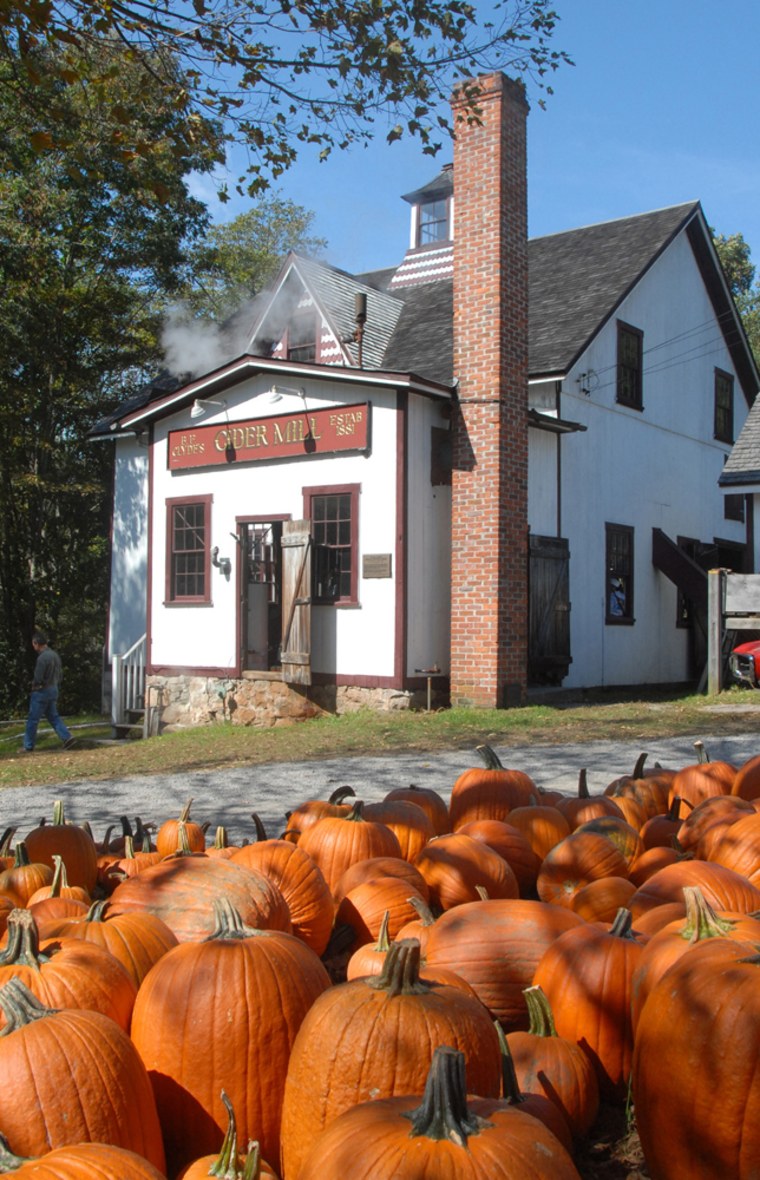A cider mill that hasn't changed in more than a century has become a seasonal tradition for weekend visitors to southeastern Connecticut.
From September through Dec. 31 each year, B.F. Clyde's Cider Mill turns on its steam engine and goes into full swing, infusing the crisp autumn air with the potently sweet aroma of newly crushed apples. The mill, built in 1898, is the last steam-powered cider mill in New England and the oldest continuous producer of hard cider.
On weekends, the cozy, two-acre property on tree-lined Route 27 is usually clogged with visitors who come to watch an engineering relic at work while sipping some of the freshest apple cider around.
The processing of apple cider in the United States dates back centuries, to the first English settlers. The abundance of apple orchards and the ease of cider-making and storage made cider one of the most popular alcoholic drinks in the nation through the 1800s. Back then, drinking cider was more common than having a beer today.
"Some of the people who wouldn't have a glass of wine in their house thought nothing of having a glass of hard cider because that was nature's medicine," said John Bucklyn, 78, whose great grandfather Benjamin Franklin Clyde started the business in 1881.
The cider industry flourished until Prohibition in 1920, when it became a crime to sell or manufacture alcohol. Despite the ban, Clyde's Cider Mill continued to produce, bootlegging the drink for customers or selling it to producers of vinegar stock. Bucklyn said his grandmother, Abby Clyde, was even arrested for selling to a prohibition agent, but the case was later thrown out.
The mill remains one of two licensed producers in the state specializing in hard cider, according to the Department of Consumer Protection Web site.
The mill uses a variety of apples from New York's Hudson Valley to make its cider, from Honeycrisp to McIntosh and Ida Reds. Red Delicious and Empire apples are also used.
"The taste of the cider actually changes everyday because we get different amounts of different types of apples," said Harold Miner, Bucklyn's son-in-law and co-owner of the mill with his wife, Annette.
The business is family-run, with five generations lending a hand. Bucklyn took over for his father right out of high school through the mid-1990s before he handed it over to Annette and Harold. The couple plan on handing it down to 26-year-old son Joshua next.
During the weekends, people can see white steam rolling out from the mill's chimney before evaporating into the air.
On a Saturday earlier this fall, the scent of apple juice drenched the interior of the mill like an autumn perfume.
Harold and Joshua worked the presses and dozens of camera-toting tourists listened as hundreds of apples tumbled through a shaft above the room, falling through an elevator where they were ground up.
The resulting glob of apple pomace went down a copper chute and landed on a cloth-lined rack, where the apples were covered up and squeezed of juice using a 100-ton press.
The juice is pasteurized in the mill's basement and then cooled before being sold. None of the cider, squeezed from between 30 and 40 tons of apples each week, is prebottled.
Paul Cerasuolo, 43, and his 37-year-old wife, Valerie, swear by the mill's cider, making annual trips from their home in Commack, N.Y., for the sweet juice.
"It just tastes very fresh," Paul Cerasuolo said. "If you could pick an apple and press it yourself and drink it, I think that's what it tastes like."
Though the couple enjoys the under-21 version of the cider, many visitors opt for the alcoholic stuff, which comes in several varieties including "Lucky Lion," a cider made with Russet apples, and "Blackout," which has raisins. The hard cider, which has 12 to 14 percent alcohol content, is aged for a year in 50-gallon oak barrels.
But apple cider isn't the only thing produced at the mill.
While the men work the presses, Harold's wife and their daughters churn out fresh apple cider doughnuts and apple crisps at the mill's retail shop, which was built about 10 years ago to accommodate the growing number of visitors.
The retail shop also sells pumpkins, apple wines, jams, salsas and other specialty items from businesses around New England. A wraparound porch allows visitors to relax with a cup of warm cider and watch as every sip brings back another time, if only for a moment.
